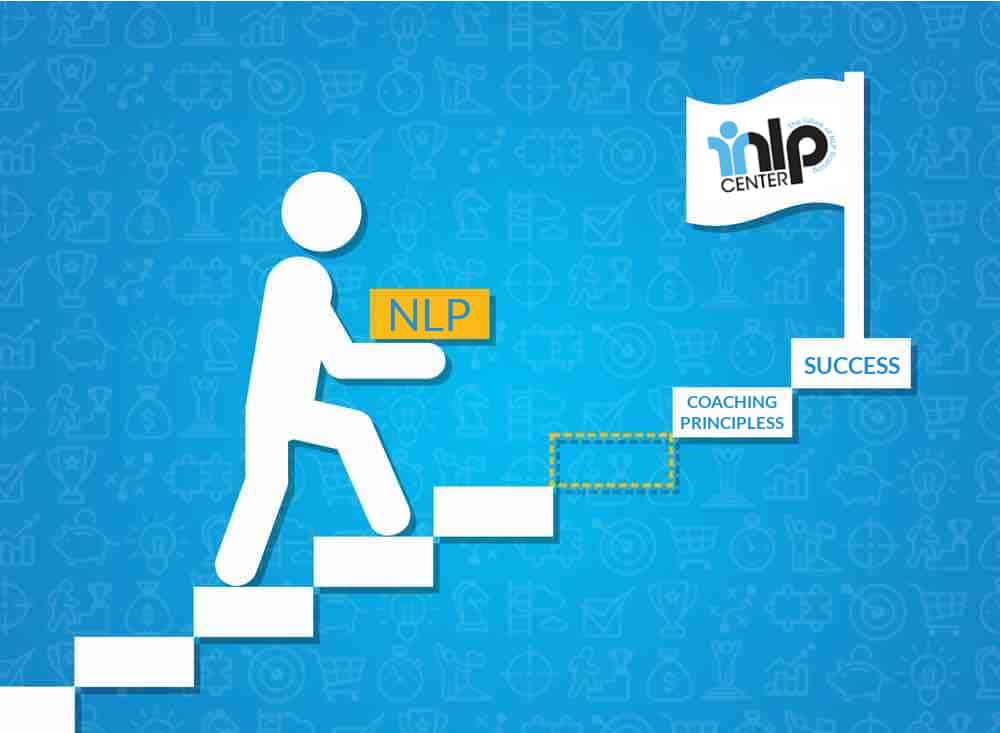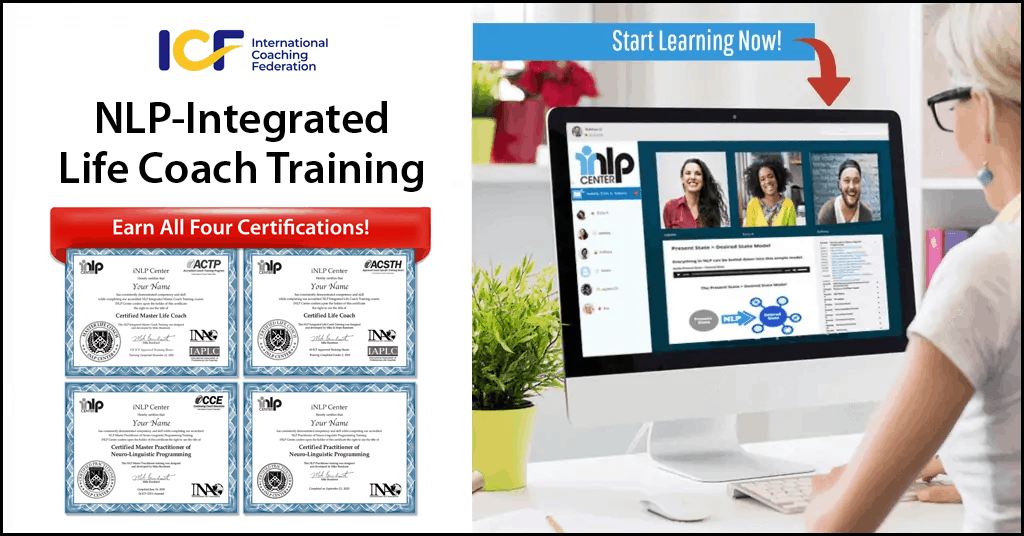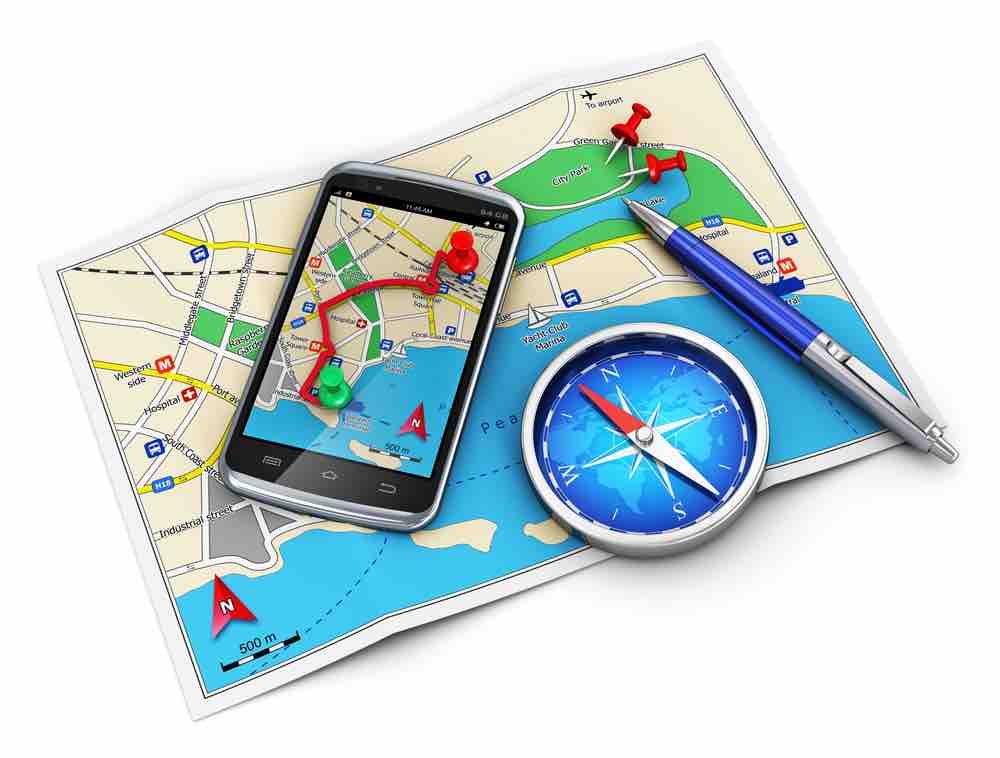The benefits of NLP training make many life coaches wonder how they ever got along without it. NLP provides essential coaching tools that are missing from most coach training programs.
What are the benefits of NLP skills for life coaches? In short, Neuro-Linguistic Programming is the how-to of life coaching. It serves as a map for success. And we all know how helpful maps can be.
The New Coach’s Greatest Fear
It’s the new life coach’s biggest fear: Getting into a session and not knowing what to do. There you are, at a total loss for words as the client waits for insight and guidance. Interestingly, drawing a blank is usually not a reflection on the coach. It’s a matter of inadequate training.
The many benefits of NLP training for life coaches include the use of essential coaching models or maps. Essential. If you don’t know how to help a client, it’s because you do not have a coaching map or model that tells you where the client is and how to move forward.
Have you ever watched a masterful coach work? It can seem like magic but it isn’t even close. Without exception, the best life coaches have learned a variety of effective coaching models or maps. Their work is the result of following the models in various combinations.

The benefits of NLP begin with using a map or model that applies to your client.
Can you imagine trying to get from point A to point B without understanding where either point is on a map? A lack of effective maps or models makes life coaching of little more value than a good lunch conversation. Coaching conversations are purposefully directional, intended to move toward the client’s goal.
Coaching models make coaching effective, turning it into a valuable commodity that keeps clients coming back for more. Sadly, most life coach certification programs teach coaching principles but not the benefits of NLP models or maps that add insight and directions to move the client from point A to B. You may understand the best coaching principles, such as the ICF Core Competencies, and still lack confidence because good principles do not a map make!
A typical life coaching process breaks down like this:
Almost all clients begin a coaching session by describing what’s going on in their life. Out of that initial conversation, coaches will typically help the client choose an appropriate goal, ask questions, and make observations that guide a client toward the goal.
A simplified breakdown:
- Describe the situation
- Choose a goal
- Coach toward the goal
This standard approach, without the benefits of NLP, is a recipe for getting lost because there is a critical element missing – the conscious use of a coaching model.
Life coaching with the benefits of NLP can easily add the missing piece. As the client gives the lay of the land, the coach first matches that description to a relevant coaching model or map. Once the client is located on the map, everything becomes clear, including possible goals, relevant obstacles, and milestones. Among all the benefits of NLP in life coaching, this one rules them all.
Imagine a friend calling who is lost in a strange city. He doesn’t even know the name of it, nor where he might stay for the night (just play along:). Your friend doesn’t have a map app but his goal is to find a hotel. So, there you are with your “client.” How will you proceed without locating him and using a map? Finding an acceptable hotel would be a matter of trial, error, chance, and time.
But you don’t need to rely on trial, error, chance, and time. Instead, pull out your phone and open a map. Find out the name of the city. Then, get the nearest cross streets and pinpoint your friend’s location. Hotel? Sure, there are options. Some are nicer and more expensive. Some are close, others far away. Some have excellent reviews. There may even be a hotel with a rewards program.
A modern map offers context and options that are simply unknowable otherwise. Maps change everything. If the benefits of NLP include life coaching models or maps, can you see why so many of us find NLP indispensable?
An NLP trained life coach adds a crucial step:

As clients describe their situation, NLP-trained life coaches listen for clues that match an applicable model or coaching map. Once located, the coaching direction becomes clear. Moving forward with a relevant coaching model yields opportunities for progress and transformation that simply would not have appeared otherwise. It’s like a lost friend describing surroundings that are familiar to you so that you can show them where they are and how to get where they need to be.
Simplified breakdown:
- Get the lay of the land
- Match with a relevant map or model
- Choose a destination (goal)
- Navigate (Coach) toward the destination
Models or maps are obvious! Less obvious is why life coaches typically understand coaching principles but don’t have much in the way of mental models or maps, especially when their profession includes helping people get from undesirable point A to desirable point B. Without a map, without getting the client’s location according to a reliable reference, you might not even know if point B is available.
Using our map metaphor, coaching principles merely show you how to drive. Start the car, fasten seatbelts, accelerate smoothly, watch for obstacles in the road, obey traffic laws, etc…The primary benefits of NLP training for life coaches include an amazing database of mental models or maps. These are a prerequisite to reaping the additional 10 benefits of Neuro-Linguistic Programming mentioned in the title of this post.
NLP models make these 10 benefits come to life:
- Understand the client clearly
- Know which questions to ask
- Offer invaluable insight
- Discuss only viable goals and options
- Anticipate obstacles and risks
- Create transformation step-by-step
- Discover alternate routes to success
- Know when you’ve gone off course
- Feel confident as a guide
- Enjoy coaching more!
Understanding the Benefits of NLP Models: Examples

Stimulus and Response: Bad reactions, triggers! This is a common complaint that NLP-trained coaches love to encounter. The NLP Anchoring model provides a simple and reliable way to isolate a trigger, “anchor” a new emotional response, and ensure that it sticks over time.
Relationship Issues: The NLP Perceptual Positions model diagrams the three universal points of view in relationships and shows you how and when to navigate them. Clients who practice perceptual positions gain tremendous flexibility, compassion for others, clear boundaries, and a big picture perspective that melts away misunderstanding.
Of Two Minds: Inner conflict may be the most unappreciated obstacle to productivity and peace of mind. You may have a goal but also hear a critical voice in your mind say, “You’re gonna fail!” Part of you wants to achieve the goal and part of you is against it, predicting disaster. The NLP Parts model is a laser-like approach to healing the inner divide. At iNLP, we call parts work Inner Dynamics, which is taught in our Mental Health Coach Training.
Goal Setting: Outcome Specification is the NLP model that systematically identifies goals, obstacles, and harnesses the inner resources needed to accomplish them. There is no better format for helping someone set themselves up for success in goal-setting.
Mindset Matters: The VAK model in NLP may as well be considered the Holy Grail of mindset shifting. While most coach training breaks inner life down into little more than thoughts and feelings, NLP takes things to the next level by identifying inner imagery, sounds, and feelings. From there, we can shift these mindset elements in ways that would have never occurred to us without the benefit of NLP.
For example, big and overwhelming problems tend to be the result of large, overwhelming internal images. Once you see the size of the mental image that represents the problem, it’s easy to shrink it. The overwhelm disappears, empowering the client to take action.
And there’s so much more! iNLP Center’s NLP-Integrated Life Coach Training offers over 50 coaching models that deliver the benefits of NLP with unlimited training. Come to as many virtual classes as you like, even after certification. Many of our students stay in our vibrant community for years, dropping in on classes to brush up, get feedback on clients, and partner with other students.

Benefits of NLP FAQ
Is NLP legitimate?
NLP has been around since the early 1970s and has made its way into nearly every industry, often without name recognition. It’s here to stay, with millions of people trained. As with any methodology, NLP has its detractors. However, the criticism is typically based on a misunderstanding of the models and their genuine application. See the Truth About the NLP Wikipedia Page.
Can you learn NLP from books?
To a degree, yes. NLP books provide knowledge but only a small percentage of people manage to turn the message into practical tools. Even so, they don’t know what they don’t know, as learning NLP properly is an experiential endeavor. You need to see it demonstrated, get your questions answered, and practice with coaching buddies in order to master the craft.
What is NLP?
Here’s the short answer: NLP is a system of personal development tools that emphasizes elements of inner life and communication that rest outside of conscious awareness. When you discover these hidden elements of your mind, you will wonder why NLP isn’t taught in grade school. This question is best addressed by reading our introductory NLP article.
Is NLP training accredited?
Yes. iNLP Center life coach training is ICF-accredited at the highest level, which is ACTP. All iNLP Center trainers are accredited with the ICF and together have over 120 years combined experience in NLP, Life Coaching and Training. The iNLP Center is also accredited by the International NLP Association.
Is NLP easy to learn?
Some NLP techniques are easy to learn and some are more challenging. All the steps in the models are simple to follow. The primary challenge (and opportunity) in NLP involves seeing the world through different eyes. Most people intuit that non-verbal communication is more impactful than verbal; how you say something is more important than what you say. Success with NLP is all about looking beyond the words and seeing the truth. Because we weren’t raised with this level of awareness, it takes practice to train your eyes and ears. Most of the time, the difficulty involved is swallowed up by fascination with the process.
Thanks for reading! If you’d like to explore more benefits of NLP, please get in touch! We invite you to use the chat form on this site to talk to us or leave a message.


